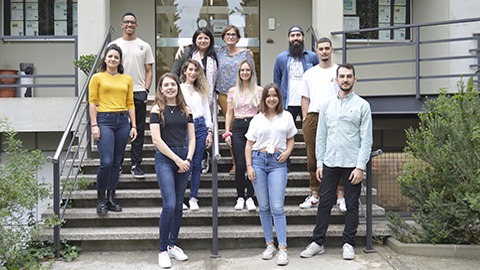UAB to design a biosensor to stratify the severity of fever in children

Researchers from the Biosensors and Bioanalysis group at the IBB, led by María Isabel Pividori, will work on the development and validation of a tool to quickly and easily measure biomarkers of fever severity in children, with the aim of increasing child survival globally. The research will be carried out within the framework of the recently launched European project EChiLiBRiST.
23/09/2022
Enhancing Children’s Lives with Biomarkers for Risk Stratification and Triage, EChiLiBRiST, is a consortium of 13 institutions from Europe, the United Kingdom, Africa and Canada, and includes the Institut de Biotecnologia i de Biomedicina (IBB) of the UAB. It is convened to develop and clinically validate a quantitative point-of-care test for the measurement of severity biomarkers to improve risk stratification of fever syndromes and thus enhance child survival. This 5-year project is funded by the European Union’s Horizon Europe research and innovation programme and coordinated by Quique Bassat at ISGlobal.
The project consists of two distinct yet complementary work streams: 1) designing and testing the device, and establishing ways to operate and regulate; 2) Clinical trials and additional studies in 3 African countries to evaluate the impact of device insertion for risk stratification, improved outcomes, treatment guidance and cost savings.
Maria Isabel Pividori, lecturer of the UAB Department of Chemistry and researcher at the IBB, with a budget of 350,000 euros, will lead the work package for the technical development and design of a laboratory prototype, its analytical and clinical validation, and the subsequent development into a functional prototype for its further production and use in clinical trials.
“The technology behind the device is based on the use of magnetic particles to pre-concentrate biomarkers to increase sensitivity, which is a must-have feature for such a risk stratification tool. The device will also be user-friendly and battery-powered, allowing its implementation at the point of care” for rapid clinical decision making, explains Pividori.
Pividori is lecturer at the Department of Chemistry and also leads the Biosensors and Bioanalysis research group at the IBB. Her research is particularly focused on the development of rapid diagnostic tests and bioinstruments. Her experience is related to improvements in terms of biorecognition, as well as the simplification of biodetection procedures, the integration of nanomaterials and the improvement of the analytical signal..
The researcher and her team will also work with BioEclosion, a UAB tech-based spin-off co-founded by Pividori, and the Eurecat Technology Centre.
One billion episodes of fever worldwide
Fever is the cardinal signal of infectious diseases, with more than a billion episodes recorded worldwide each year. On average, a child under 5 years of age in sub-Saharan Africa (SSA) has up to 6 episodes of fever annually. Though most episodes are mild and self-limiting, some can progress to life-threatening disease. In SSA, 50% of child febrile deaths occur at the community level, without access to formal healthcare.
“Fever is an excellent warning system for clinicians, but it can often be difficult to distinguish fever due to life-threatening infections from fever due to a self-limiting and benign condition. With the EChiLiBRiST project, we aim to measure severity biomarkers at the patient’s bedside, with the hope to transform fever management globally. With a more targeted focus on those truly requiring prioritization, we can reduce death, disability, and healthcare costs,” explains Quique Bassat, the Principal Investigator of the project.
Beyond the clinical and technological rigour of the study design, there are other notable aspects including its interdisciplinary approach to ensure that the new product is compatible for use in low-income settings, and that the data generated can be useful for modelling and predicting impact and cost-saving in different scenarios. Additionally, the project has also committed to train 3 African graduates from the participating countries (Mozambique, Ethiopia and Gabon) with different disciplinary backgrounds to obtain a PhD.
“Building a common pathway from diagnosis to treatment is of utmost importance, especially in the African context with irregular access to health services,” says Bàrbara Baro, Scientific Coordinator of the project. “EChiLiBRiST holds the potential to reverse child mortality trends from commonly treatable diseases in low-income countries.”
Other institutions participating in the project are Eberhard Karls Universitaet Tuebingen, Fundaçao Manhica, Centre de Recherches Medicales de Lambaréné, Asphalion and Ospedale Pediatrico Bambino Gesu.